Budgets, Public Safety, Bridge Maintenance, and More
Friends and Neighbors,
October has been bursting with work on Seattle’s $6.5 billion budget for 2021. I’ve spent the last few weeks working with the Durkan Administration, my Council colleagues, and constituents to consider how best to finalize a budget that works for all of us in the face of the economic and public health crisis caused by COVID-19. While I’m working collaboratively with some of my colleagues to advance constructive amendments to what was already a reasonable budget from Mayor Durkan and her talented team, I have to admit that striving to finalize a sensible and sustainable budget to make Seattle better has surfaced a few frustrations:
- HOMELESSNESS: Several of my colleagues on the City Council still want to dismantle the dedicated team of city government employees who had been engaging with unauthorized homeless encampments (formerly known as the Navigation Team). Meanwhile, encampments appear to be growing — including those with fire or public health hazards. (See below for my Tiny Home Village idea to help.) I believe City Council should ensure practical and effective plans are carefully crafted and in place before making drastic budget changes.
- SAFETY: In the face of new data showing highly experienced police officers leaving our police department at a higher than expected rate, some Councilmembers are still attempting to deeply defund SPD immediately without first scaling up effective, community-informed alternatives. I agree we must deliver justice within this historic racial reckoning and fundamentally revamp how we deliver “public safety” — yet, to achieve meaningful improvements, we must focus on the major problem: the need to revamp the expensive, inflexible, and unjust police union contract. All roads to progress lead back to the contract.
- PRIORITIES: Policymakers often say “a budget is a statement of our values.” Yet City Hall seems poised to grant another year of pay increases for city government (nearly $40 million for 2021), instead of trying to renegotiate contracts in the face of back-to-back deficits to save jobs and to redeploy those dollars to house people experiencing homelessness, to repair Seattle’s bridges that our City Auditor confirmed are in dangerous condition, and to get dollars out the door sooner to marginalized BIPOC communities.
COMMON GROUND: While I’ve emphasized the need to save money to redeploy to urgent priorities, revamp our police contract, and repair our aging bridges, a more upbeat budget item where there is common ground with my Council colleagues and the Mayor is called “Health One.” Last week, I rode along with the Seattle Fire Department’s “Health One” team, which is currently just downtown. Health One is a relatively new model that combines firefighters and case managers from our Human Services Department to engage with people experiencing a behavioral health crisis or other distress on our city streets in a way that prevents more expensive and dangerous situations. The goal is a more effective intervention to link the person to other services rather than reacting and sending them to expensive visits to emergency rooms or, worse, the criminal justice system. Mayor Durkan is prudently proposing to double this model and I would like to see it expanded further into neighborhoods such as District 4’s University District. It’s also apparent that the teams will need more data analysis support to follow-up with the growing number of cases and to analyze trends with patient care and hot spot locations.
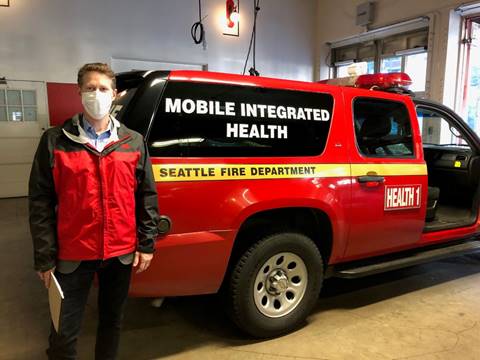
This newsletter provides more details on the City’s $6.5 billion budget, District 4 news, and updates about the response to the COVID pandemic.
Thank you for joining us remotely at the District 4 Budget Town Hall!
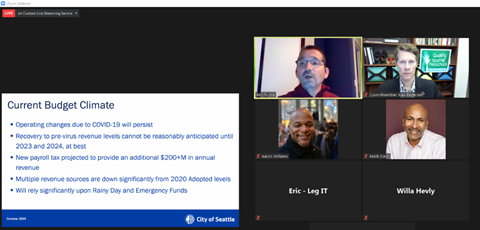
Thanks to those who participated virtually in the District 4 Budget Town Hall on October 8, 2020. The discussion focused on Mayor Durkan’s Proposed 2021 Budget and, because public safety is a major portion of the budget, we spent time with the co-chair of the Seattle Community Police Commission, Reverend Aaron Williams who has worked on social justice issues for many years and who leads a church in District 4. Reverend Williams told us,
“Police contracts are very important. Police contracts are one of the keys to police reform. When you’re talking about changing anything from the discipline of officers to them receiving pay and what-have-you, it all comes back to contracts…We’re hoping people like you, Councilmember Pedersen, will help make sure the City finally delivers on its promises to community and fully implements the reforms that were established under the 2017 accountability ordinance…We want to make sure police accountability is strengthened statewide…So I think it’s important that we’re still focusing on police contracts as a major part because it’s undermining the accountability process…We do believe police officers deserve a police contract, but it should not be undermining the accountability process…The [federal] consent decree is still in operation.”
Thank you for those who sent questions regarding the City’s next steps for reimaging public safety and for investing in BIPOC communities – which I believe is urgently needed now. If you’d like to view the video of our town hall, CLICK HERE. For the PowerPoint presentation, CLICK HERE.
Balancing the budget
must continue at City Hall
After receiving the Mayor’s proposed budget and several days of presentations from City departments, City Council entered the “Issue Identification” step of the budget process. Based on constituent feedback, I submitted several requests for potential amendments to the budget, including more maintenance of our city’s aging bridges, more protection for our trees in our Emerald City, more transparency for the expensive pension benefits for City government, and more data on police response times. In budget meetings this week, Council will discuss specific changes each Councilmember is pursuing.
Here are my remarks during “Issue Identification” on October 15:
“Considering the multiple crises we are facing, including back-to-back deficits for 2020 and 2021, I believe Mayor Durkan and her team have put forward a budget that is thoughtful and reasonable and I hope my colleagues on the City Council choose to consider it in a collaborative and constructive manner. Fortunately, we already have laws on the books that govern how we build up our Rainy Day reserves over time. If now is not the time to deploy our Rainy Day funds with a global pandemic and back-to-back deficits, I cannot imagine when that would be. I would, however, like to strengthen the current savings policy so that we build up future reserves faster.
“An important critique that I believe we must put on the table for discussion is whether we really want to increase salaries by nearly $40 million — on top of pay raises received by the city government this year and last year. When so many people are out of jobs and our city has so many deep needs, I don’t think it’s the right time to increase the pay of city government again. So if you look at page 28 of the Miscellaneous Issues memo, you’ll see a range of options to save anywhere from $5 million to nearly $40 million simply by forgoing those pay increases next year. Let’s reinvest the millions of dollars of government pay raises to provide shelter and mental health support for people experiencing homelessness so they are no longer living in our parks. Let’s reinvest the millions of dollars to invest further in BIPOC communities. Let’s reinvest the millions of dollars to increase the safety of our city’s aging bridges. City government can and should invest more in our most vulnerable populations and our aging infrastructure, instead of putting more money in our own pockets. In addition to helping the homeless and our bridges, forgoing pay raises now could also help to save city jobs and prevent layoffs in the future.”
Here is a chart showing various options for redeploying dollars from city government pay increases scheduled for 2021 to other urgent needs:
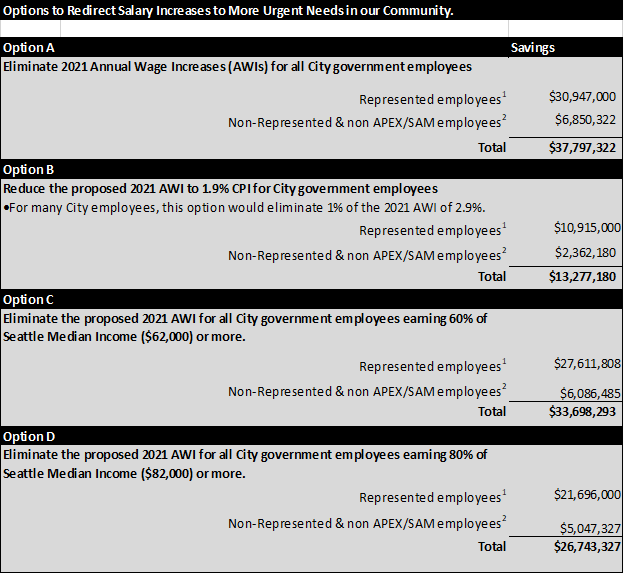
1 Represented employees = City government employees covered by labor unions. Changes would be subject to bargaining between our Labor Relations Policy Committee (comprised of Councilmembers and leaders from our executive branch both representing management).
2 Non-represented & non-APEX/SAM employees = non-represented employees who have historically received the same wage increases as City government employees represented by labor unions.
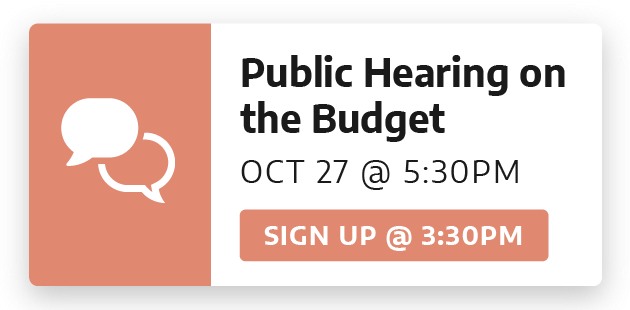
YOUR VOICE ON THE BUDGET: In addition to the budget public hearing on October 6, my Town Hall on October 8, and public comment at every Council meeting, we are having another public hearing on the budget on Tuesday, October 27 at 5:30 pm. You can sign up to speak at THIS LINK two hours ahead of time. You can also always email me (alex.pedersen@seattle.gov) or all Councilmembers (council@seattle.gov) to let us know what you’d like to see in this year’s budget. We look forward to hearing from you.
To read more about the budget on my blog, CLICK HERE. For the memos and presentations from the budget meetings, CLICK HERE.
Revamping Public Safety Requires
Revamping the Police Contract:
What’s taking so long?
Whether you want to reduce costs to Seattle taxpayers or make the disciplinary system more fair or deploy mental health professionals instead of highly trained police officers, everything helpful seems to be blocked and controlled by the 100-page police union contract. While attention has been focused on blunt budget cuts and bumper sticker slogans, all roads to meaningful justice and equity for Black, Indigenous, and other people of color communities lead back to reworking the unjust, inflexible, and expensive police union contract. Since last writing on this matter, there seems to have been no substantial movement by either the executive/legislative committee charged with negotiating all labor union contracts or the police union. For more about the Labor Relations Policy Committee, CLICK HERE. To read an interview where I discuss that unjust contract, CLICK HERE. While I do not serve on that critical committee, I stand ready to help my colleagues achieve progress.
While encouraging City Hall policymakers who are in the official position to revamp the police union contract, I have also encouraged police reforms at the State level which will strengthen our negotiating position locally. I appreciate former Council President and Mayor Tim Burgess (my former boss) and former monitor of the federal Consent Decree Merrick Bobb for their recent editorial calling for needed state reform. You can read their article at THIS LINK.
In addition, I’m asking for these items as part of our budget process:
- An assessment of 9-1-1 emergency response times in light of increasing attrition and demands on police resources.
- An assessment of potential savings from moving expensive traffic control functions out of the Police Department to save money for other community needs.
Around District 4

Photo: Seattle Parks & Recreation
PARKS IN D-4: There’s a new park open on Portage Bay in District 4! Check out Fritz Hedges Waterway Park. This welcoming open space is named after Frederick “Fritz” Hedges, who was a long-term Parks professional with the City of Seattle. The new park is located at 1117 Northeast Boat Street. That’s east of the University Bridge (which needs repairs!) at the southern point of the University District, just a block from the Agua Verde restaurant. When I visited the park recently, I saw many people (and ducks) enjoying this lovely new connection to our waterfront, thanks to our Seattle Parks Department. For more info on how to visit the new park, CLICK HERE.
I hope you’re also enjoying all the city play areas that opened back up starting October 6 as well. Remember to stay home if you’re sick, have any child over the age of two wear a mask, and maintain six feet of distance away from other households.
COMMUNITY COUNCILS IN D-4: On Thursday, October 7, I returned to the Wallingford Community Council to discuss our City budget process and to celebrate with WCC on finally achieving progress with Waterway 20 by passing Council Bill 119882. It was a robust conversation that included questions on the City’s plans to address homeless encampments and next steps for reimagining public safety. To participate in the Wallingford Community Council, CLICK HERE and for other community councils in District 4, CLICK HERE. Thanks to all the community councils in District 4 for inviting me and my staff to visit and listen.
VOTING LOCATIONS IN D-4: Have you turned in your ballot yet?
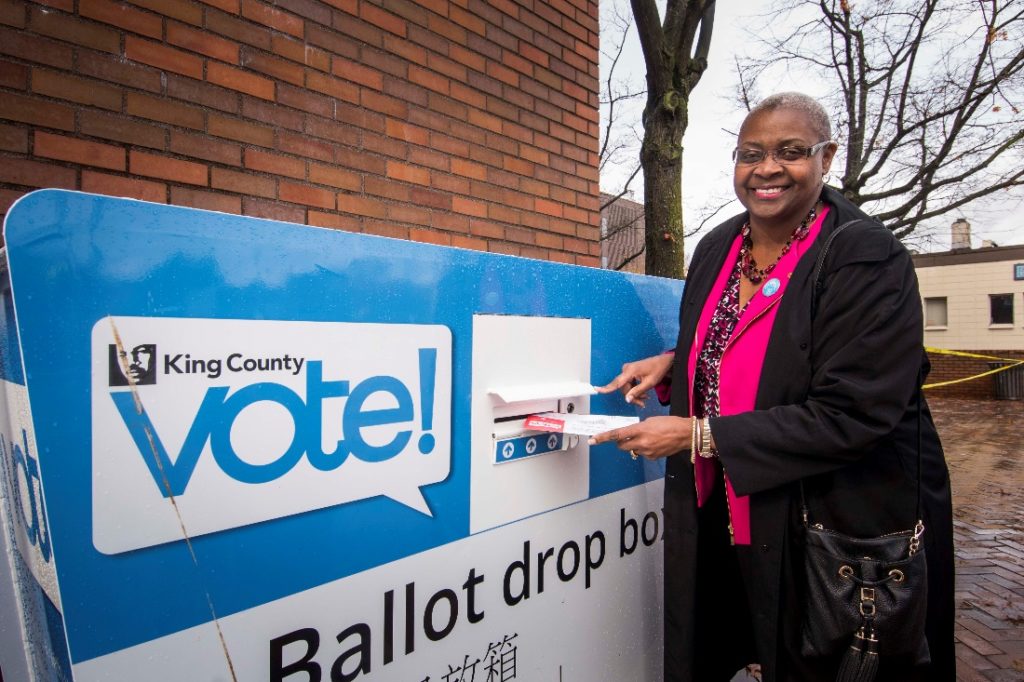
LAST-MINUTE DROP BOXES IN DISTRICT 4: As you can see from this map, if you want to use a reliable, last-minute Drop Box instead of a regular postal service mailbox, King County has placed them throughout the area including in D-4: Magnuson Park, the University District, and near Gas Works Park in Wallingford. There’s also one on the east side of Green Lake.
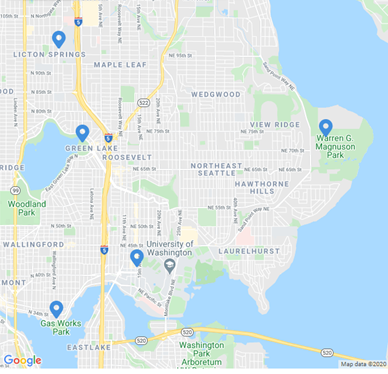
Help King County see historically high voter turnout this year! Ballots must be postmarked by November 3 or returned to a drop box by 8:00 pm that day. King County Elections has more information: CLICK HERE.
For a guide to surviving the stress of social media during the elections, CLICK HERE for a Seattle Times article. Trump loves Twitter, but there is a lot of misinformation and biased sources on social media, so this guide can help you stay informed and sane.
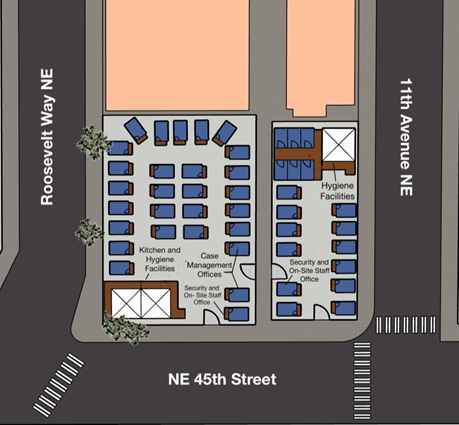
Many constituents have contacted me with concerns that the number of unauthorized encampments around District 4 has grown and, as I travel through the district each day, I see the suffering with my own eyes. The public health social distancing requirements of the COVID pandemic have required homeless shelters to “de-intensify,” thereby reducing their capacity by approximately half. Fortunately, the Durkan Administration has created additional shelter opportunities and has a plan for surging temporary housing as part of their 2021 budget. Unfortunately, a majority of my colleagues on the City Council still plan to defund and dismantle the team of city government employees that had been responding to homelessness (the Navigation Team).
To help to respond to what appears to be an increase of people experiencing unsheltered homelessness, I have worked with a local nonprofit and submitted an amendment to the budget to set aside funds necessary for a temporary new Tiny Home Village in our University District, which would have good access to transit. Used by Sound Transit for field offices during the construction of the Brooklyn Avenue light rail station (which opens next year), this small, centrally located site is scheduled for permanent affordable housing in a year or two. Given the ongoing COVID-19 pandemic and homelessness crisis, I’m hopeful that a well-organized “village” of 30-40 “tiny homes” can be a cost-effective intervention as long as it is operated by a nonprofit experienced in exiting people to permanent housing in conjunction with case management and a performance-based contract with our Human Services Department. Our district has been home to various iterations of temporary and approved encampments and has generally been welcoming if the location makes sense and there is a plan.
We have seen a sharp rise in homelessness in our district and I’m hopeful this will help to address it until shelters throughout our region can restore their capacity, until the new Regional Homelessness Authority is fully addressing this regional problem– all while our Seattle Office of Housing continues to fund the construction of permanent affordable housing as fast as it can. Results instead of rhetoric. If you have comments or concerns about this partial solution, please contact my office at Alex.Pedersen@seattle.gov
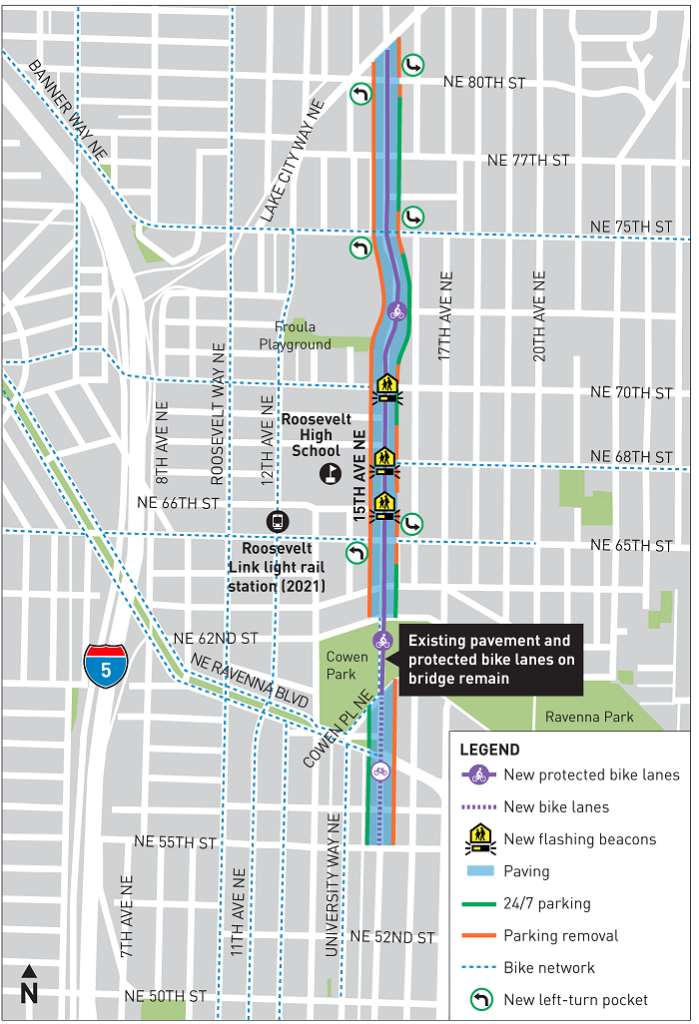
After lengthy community engagement, including doorbelling neighbors myself before the pandemic hit, another street improvement project is under construction in District 4: over a mile of 15th Ave NE between NE 55th Street and Lake City Way. This project is more than just repaving the street by the Seattle Department of Transportation. It includes updating water and sewer lines by Seattle Public Utilities, adding protected bike lanes, reconfiguring or removing some parking, and adding a few turn lane pockets for safety. As I explained when we completed the seismic retrofit of the Cowen Park Bridge, I support these particular bike lanes — “after consulting with neighbors and considering the excellent connections to Roosevelt High and 2021 light rail as well as minimal impact on neighborhood businesses.” Construction started in September and will continue for more than a year. Disruptions are a certainty. If you’d like more information about the current condition and timing of work, please go to SDOT’s project page by CLICKING HERE or send an e-mail to 15thNEpaving@seattle.gov.
BRIDGES NEED WORK — EVEN IN AND AROUND DISTRICT 4!
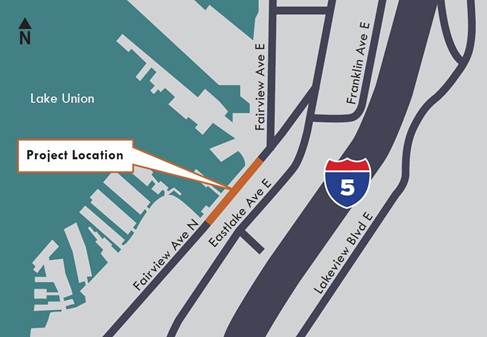
As Chair of our City’s Transportation Committee since January, I ordered an audit of all City-owned bridges shortly after SDOT suddenly closed the West Seattle High Bridge in response to accelerating cracking. It turns out that two bridges directly impacting District 4 have been severely neglected over the past several years and need fixing: the University Bridge and the Fairview Avenue Bridge. Thankfully, the Fairview bridge is being replaced now. As Eastlake residents and businesses know well, work started last year to replace the Fairview Avenue Bridge which goes over the edge of Lake Union at the southern end of the Eastlake neighborhood where Council Districts 4 and 3 meet. The work is expected to be completed next spring (2021). For more information on this SDOT bridge project, CLICK HERE. For the University Bridge and other Seattle bridges ranked “poor” or “fair,” I hoped to redirect additional resources from the City budget — if my colleagues on the City Council agree that keeping our infrastructure safe is a priority.
Regarding the West Seattle Bridge, the Mayor prudently delayed her decision on Repair vs. Replace until after the election to gather more input. SDOT released a cost-benefit analysis on six options which you can review by CLICKING HERE — and there is a faster new proposal (“Rapid Span Replacement”) you can consider by CLICKING HERE (see photos below). For more extensive coverage this week, check out the blog of our West Seattle Councilmember Lisa Herbold by CLICKING HERE.
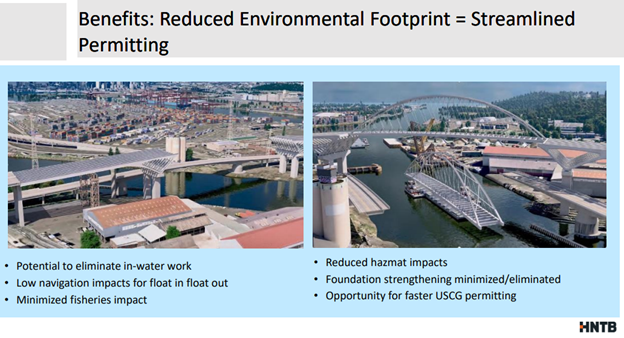
BOOKS IN D4: While the 26 branches of the Seattle Public Library aren’t open to the public during the pandemic, select locations including the Northeast Branch here in District 4 are now offering curbside pickup service. CLICK HERE to learn more. Congratulations to the Seattle Public Library for winning the 2020 “Library of the Year” award.
Seattle Continues COVID-19 Response

Small Business Resiliency Grant Program from Washington State:
For small businesses, the Washington State Department of Commerce launched a Community Small Business Resiliency Grant Program using $5 Million of Federal CARES Act Relief Funds. Grant funds can be used to cover working capital shortfalls due to COVID-19 hardship. Commerce’s intent is to award each eligible applicant the maximum award available up to $10,000, based on the number of applications. Applications will be accepted between until 12 p.m. October 28, 2020. For more information and to apply, CLICK HERE.
Aid to Immigrants: Applications for Seattle’s COVID-10 Disaster Relief Fund for Immigrants close on November 5. Please apply for this direct cash assistance if you were excluded from federal stimulus checks and state unemployment insurance due to your immigration status. Payments will occur after December 1. CLICK HERE to learn more and apply.
Updates on UW COVID Cases: For more on the outbreak at some off-campus fraternities and sororities, CLICK HERE.
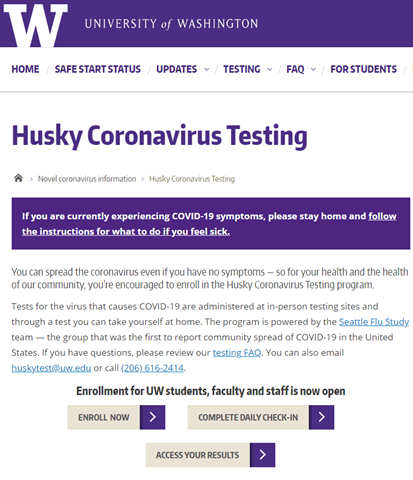
Mask Up! As I have written in nearly every newsletter since the beginning of the pandemic, please keep wearing your mask and maintaining social distance. As you might have heard, public health officials are alarmed at the increasing rate of new infections in Washington. Continue to do your part to protect yourself, your family, and our District 4 community. You can keep up-to-date on the latest COVID-19 news via the SEATTLE TIMES, CITY OF SEATTLE, KING COUNTY, and STATE OF WASHINGTON websites.
WE WANT TO HEAR FROM YOU
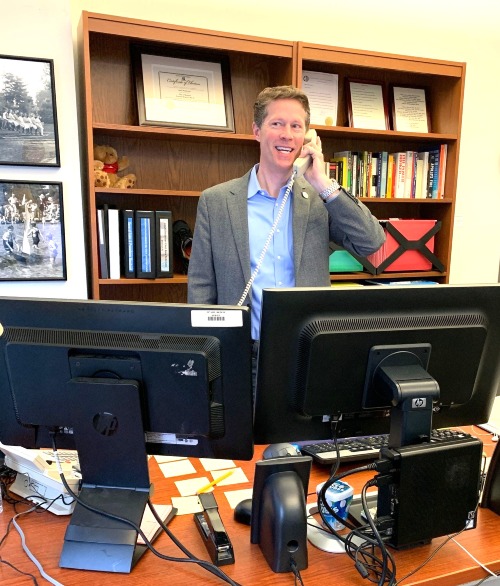
City Council Meetings on the Internet
Listening: Even though City Council is not currently holding meetings in person in order to follow public health guidelines, you can still follow along by listening on your computer or phone by CLICKING HERE. You can also listen on your phone by calling 253-215-8782.
Commenting: You can also submit public comment by sending an e-mail to me at Alex.Pedersen@seattle.gov or to all 9 Councilmembers at council@seattle.gov. Please remember to add “For City Council Meeting” in the comments. Now you can also phone into the meeting to speak directly to the Council live. For the instructions on how to register and call in, CLICK HERE. Sign up begins two hours prior to the meeting start time.
We are still receiving a very high volume of e-mails (for example, over 1,000 e-mails about the Mayor’s recent vetoes), so I ask for your patience as we try to respond to those District 4 constituents who asked for a response. Either way, we read your e-mails and they have an impact. Thank you for taking the time to contact me.
Virtual Meetings with Your Councilmember Pedersen
I continue to schedule virtual in-district office hours, so we can chat “in person.” Please continue to sign up through my website or by CLICKING HERE so I can hear your ideas, concerns, and requests. You can also just send an e-mail to alex.pedersen@seattle.gov
For previous e-newsletters, visit my blog by CLICKING HERE.
We will get through this together Seattle!
With gratitude,

Councilmember Alex Pedersen
Seattle City Council, District 4
Email: Alex.Pedersen@seattle.gov
Find It, Fix It
Posted: October 26th, 2020 under Councilmember Pedersen
